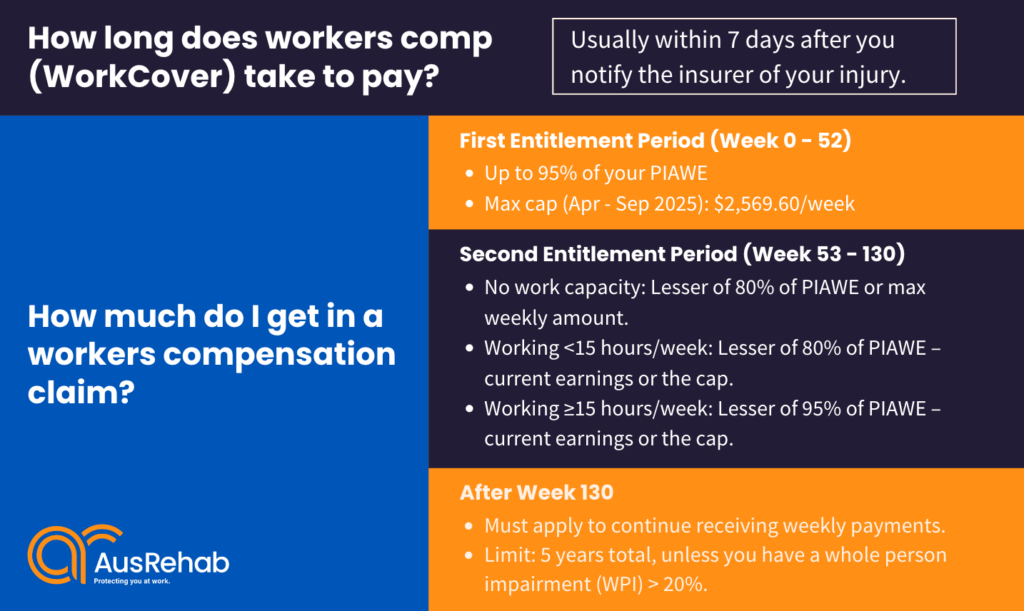Our Services
Resources
For Businesses
For Workers
May 08, 2025 • 9 min read
How much is a workers compensation payout in NSW? Explore our latest guide to learn workers comp benefits you’re entitled to, how much you get, and for how long.

Written by: Ginny Cai
Injured at work = extra financial burden? Not exactly. Workers compensation has got your back – it is meant to reduce the financial stress from a workplace injury. This way, you don’t have to worry about losing income from fewer work hours.
This comprehensive workers compensation payout guide outlines the types of benefits you’re entitled to, how much you can receive, and how long you may be eligible for workers compensation payments.
To claim the benefits you deserve, it’s important to understand how workers compensation payouts are structured. In NSW, the type and amount of compensation you receive will depend on the nature of your injury and your individual circumstances. The main types of payouts include:
In a workers compensation claim, the most common and frequent benefit you’ll receive is the weekly payment, which typically begins within 7 days of notifying your injury as provisional payments. The amount you receive will depend on the nature of your injury, your work capacity, and how much time has passed since the injury occurred.
You may receive up to 95% of your PIAWE, whether or not you have work capacity. If you do have some capacity to work, you’ll receive the lesser of 95% of your PIAWE, or the maximum weekly compensation amount ($2,569.60 as of 30 Sep 2025), minus any current weekly earnings.
Depending on your work capacity, your weekly workers comp payout amount varies:

If you still need ongoing support after 130 weeks, you must submit a written application to your insurer. You may continue receiving payments — up to the lesser of 80% PIAWE or the maximum weekly amount — for a total of five years.
If your permanent impairment is over 20%, you may continue receiving weekly payments until you reach the Commonwealth pension age.
Note that as you get better and start gaining some capacity to work, the amount of your weekly payment might be reduced. There are also a couple of reasons why your benefits may be suspended.
The threshold for permanent impairment lump sum is either a 10% permanent physical impairment, or a 15% psychological injury. This lump sum is provided in addition to weekly payments and reimbursement for medical expenses. The maximum lump sum for permanent impairment is $220,000, with an additional 5% available for permanent impairment of the back, if applicable.
Work injury damages (WID) refer to compensation for a work-related injury caused by the negligence of your employer or another party. You may be eligible to make a WID claim if you have at least 15% permanent impairment and have already received all statutory lump sum entitlements.
Once a WID settlement is finalised, you will no longer receive weekly payments or medical expenses, and any weekly benefits previously paid must be repaid from the lump sum settlement.
To ensure you continue receiving your workers compensation benefits intact and without interruption, here are the legal obligations you must conform to:
Failure to meet these responsibilities may result in a suspension of weekly payments. Staying compliant not only protects your entitlements but also supports faster recovery and better return-to-work outcomes.
You can usually receive weekly payments for up to 2 years, with a possible extension to 5 years through a written application.
If your permanent impairment is over 20%, you may be eligible to receive payments until pension age, subject to ongoing work capacity assessments (unless the impairment is over 30%).
Yes — NSW operates under a no-fault workers compensation system. You’re still entitled to benefits (except WID) as long as your injury is work-related and not caused by wilful misconduct.
PIAWE refers to your pre-injury average weekly earnings. This includes your wages, paid leave, any overtime and commissions, but the superannuation is not included.
As of 1 April to 30 September 2025, the maximum for workers compensation is $2,569.60 per week, subject to twice-yearly indexation on 1 April and 1 October.
Yes. Certain groups receive extended weekly payments during any period of incapacity. Specifically, if you are:
there are some differences in the arrangement of your weekly payouts. Refer to SIRA’s latest policies for further details.
Workers compensation benefits are designed to reduce the burden while you’re recovering from a work injury. But at the end of the day, it’s your health and work capacity that bring long-term stability and career progress.
Recovering and returning to work should be your top priority — and it’s ours too. At AusRehab, our team is dedicated to assisting your rehabilitation, from linking you with workers comp doctors to helping you navigate your career options. We are here to take care of every step of your recovery, so that you can worry less and focus on your recovery with zero costs.
If you’ve been injured at work, don’t hesitate to reach out.
Speak to one of our rehabilitation consultants today and let us help you get back on track.
Want to Make a Change? Share with Anyone, Anywhere.
Don’t forget to share!

Resolve your work
place injury today